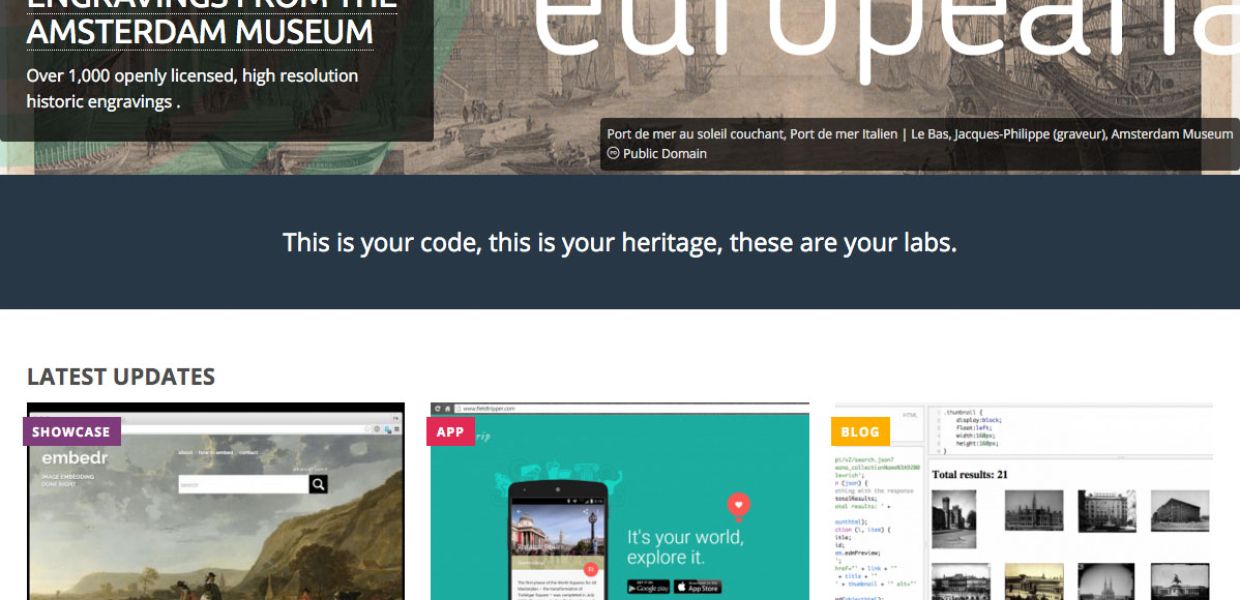Get more out of the new Europeana Labs

Since April 2014, we’ve been working with culturally minded developers and cultural heritage institutions to make Europeana Labs the go-to place for practical resources for using and building with cultural collections. We’re delighted to say we’ve now relaunched the site with greater focus, an improved product and better services, not to mention a new visual design.
What’s new with Europeana Labs?
Here’s an overview of the improvements we’ve made:
Improved API features and documentation
Based on your feedback, we have updated and extended our three APIs:
- The REST API has been extended with powerful features giving you the ability to search for and filter Europeana’s collections by what media files are directly available. For example, you can now retrieve just those records which have extra-large images, or maybe you're after high-quality audio files. Of course all these extra features can be combined with existing text, metadata and licensing filters. Read our 'how to' guide if you're a developer looking to access media files for your app, or explore the Europeana Collections to view and manually download individual items.
- The Europeana Linked Open Data service has been updated to provide access to over 45 million items. Explore, access and download metadata through the SPARQL endpoint provided by Ontotext.
- The Europeana OAI-PMH Service uses the Open Archives Initiative Protocol for Metadata Harvesting (OAI-PMH v2.0). The service is currently in beta, which means that access to the service is limited. To use it, email api@europeana.eu
We've also updated the documentation for all three services.
You can provide feedback on our API services via our forum.
More re-usable datasets
Over 80 datasets give you access to more than one million openly licensed and directly accessible items. Refine them with a range of filters that now show the number of datasets in each category - for example you'll currently find 30 for ‘History’ and 25 for ‘Photographs’.
Even more datasets will be added each month so keep coming back to see what’s new.
Stronger ‘Apps showcase’
Labs now provides over 160 examples of cultural heritage apps and tools, separated into three categories:
- ‘Showcase’ gives you examples of apps, games and other creations that use the Europeana API to make use of Europeana collections.
- ‘Tools’ are specific tools for working directly with the Europeana API.
- ‘FLOSS’ are other open source tools relevant for digital cultural heritage developers.
Where possible, each entry includes links to relevant code and documentation.
As with the datasets, you can refine the ‘Apps showcase’ using a range of filters, such as ‘Linked Open Data (8)’, or ‘Gaming (6)’.
New incubation section
Although we can’t provide financial assistance for the development of prototypes and concepts, we can provide a range of valuable support services. Our new, simple incubation process can help you at every stage, from idea generation to market-ready product.
- Somewhere to play - find the location of a physical lab near you that you can visit to experiment with digital cultural content, as well as build and test your prototypes.
- Co-creation - when you’re in development mode, take a co-creation workshop to test variations, scenarios and feasibility of your prototype with our partner, Platoniq.
- Crowdfunding - when you’re ready to bring your prototype to market, find alternative financing strategies, take a crowdfunding workshop and create a crowdfunding campaign.
Book a co-creation or crowdfunding workshop using our easy online form.
Better communication
To help you make the most of Europeana Labs’ services, we’ll be talking to you more from now on. We’ll post more events and write more blogs. You can also sign up to our newsletter to get our news straight to your inbox.
And don’t forget to share your own developments with us - send us an email api@europeana.eu
Want to know more about the work we’ve done on Europeana Labs? Read a summary of the Europeana Labs’ business plan
